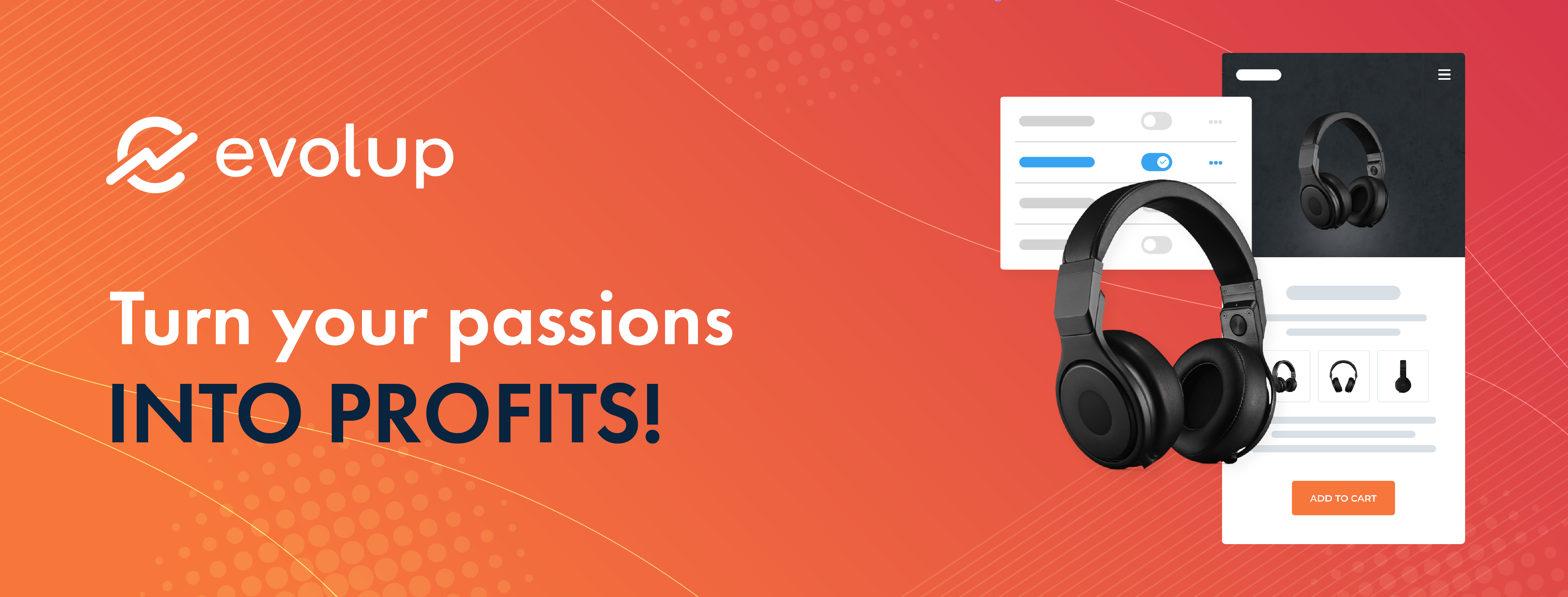In this article, you’ll discover the following:
- Even those without technical backgrounds can start an AI-driven business using user-friendly tools and platforms designed for ease of use.
- AI services provide scalable solutions accessible to solo entrepreneurs and startups, offering premium outcomes without big budgets.
- AI tools like chatbots and recommendation engines personalize the shopping journey, improving satisfaction and boosting sales.
- Entrepreneurs can use AI to generate high-quality product descriptions, blog posts, and ad copy with minimal effort.
- Before you start an AI business, it’s important to determine who your target audience is, what makes you stand out, how you’ll measure your success, and what the risks of launching your business are.
Big data, artificial intelligence (AI), automation, new technologies... The last few years have seen the acceleration of AI at the core of our daily lives.
Individuals and professionals alike cannot detach themselves from these models, which are an integral part of the habits of billions of people across the planet. Between skepticism and enthusiasm, one thing is certain: AI supplies the opportunity for us to diversify our skills, to the point of having the tools we need to launch businesses clearly based on its functionalities.
Statista data analysis shows that the AI market is predicted to amount to around $244.2 billion in 2025 and reach a little over $1 trillion by 2031. For aspiring entrepreneurs looking for an opportunity to start a new business, it’s clear that the exciting world of AI offers lots of potential!
How can you become a player in this change in society, and what are the best AI business ideas you should be launching for your startup without delay?
Table of contents
- AI: Definition and key characteristics
- Advantages of working with AI
- What business can you launch with the help of AI? 19 Best startup ideas
- What questions should you ask yourself before taking the plunge?
- Tips for creating an AI tool for your startup business
- AI-based business opportunities: The world is your oyster!
AI: Definition and key characteristics
How is AI defined and what are its objectives?
AI is a constantly evolving form of technology that’s generating a great deal of interest and enthusiasm worldwide. Although there’s no single definition of AI, it can be defined as a technology that enables machines to perform tasks that normally require human intelligence, such as recognizing speech and images, making decisions, and learning and understanding natural language.
It’s true that AI is one of the most exciting and promising technologies today. But beyond its fascination, AI has one crucial main objective: to improve our daily lives by enabling us to better understand, analyze, and solve complex problems, while freeing up our days.
The aim of AI is to improve the effectiveness and efficiency of human processes by creating intelligent systems that can learn, adapt, and make autonomous decisions based on helpful insights.
But how does this primary goal of AI translate in technical terms, and what are the benefits of artificial intelligence? There are many ways of answering this, but here are a few examples:
- AI uses data processing algorithms to analyze large sets of information, detecting patterns, correlations, and trends. This capability is crucial for obtaining valuable insights that help humans make better decisions based on accurate and reliable information.
- AI uses modeling techniques to simulate real-life situations, predicting possible outcomes based on different variables. This function is extremely useful in scientific research, finance, healthcare, and many other sectors that require accurate forecasts.
- AI uses image recognition techniques to identify complex patterns in images, sounds, and text. This capability underpins facial recognition, speech recognition, machine translation, and more.
In every field, AI works to improve forecasting accuracy, reduce human error, speed up decision-making processes, boost productivity, improve the quality of products and services, and cut costs.
What are the different types of AI?
Several categories of AI are currently being considered. This makes it easier to segment the uses and skills of each, although they can sometimes be combined within the same technology.
- Weak AI or “narrow AI”: to accomplish specific tasks and is often used in fields such as speech recognition, image recognition and machine translation. It cannot adapt to tasks other than those for which it’s been programmed.
- Strong AI or “general AI”: to mimic the human ability to understand and reason. It’s capable of learning new tasks without being explicitly programmed and can adapt its knowledge to new environments.
- Symbolic AI: uses rules and symbols to represent knowledge and solve problems. It’s often used in applications such as information retrieval, legal reasoning, and planning.
- Connectionist AI or “neural networks”: to mimic the functioning of the human brain, using models of interconnected artificial neurons. It’s often used in applications such as pattern recognition, data prediction and classification. It’s also known as machine learning.
- Hybrid AI: combines different types of AI to solve complex problems. For example, it can combine neural networks for pattern recognition and symbolic systems for planning and reasoning.
To date, a number of AI examples and AI software and tools are on the rise, including GPT-3 and GPT-4, as well as DALL-E 3 (now replaced by GPT Image 1), all from OpenAI.
For GPT-3 and GPT-4, these are AI models of natural language processing. This enables the technology to generate text with a high degree of accuracy and consistency.
GPT-3 is trained on a vast amount of text data from diverse sources such as books, newspaper articles, websites, discussion forums, and social media platforms. This natural language model serves as a kind of virtual assistant and can be used for various tasks such as text generation, machine translation, text classification, and even chatbot creation.
Its GPT-4 evolution goes even further in understanding and reasoning, tending towards a system of thought close to that of humans.
With this technology, the machine is capable of precisely analyzing images and videos and translating them into text. Of course, version 4’s functionalities are far more advanced and precise, with fewer errors.
In terms of image processing, DALL-E 3 is the evolution of DALL-E and DALL-E 2. It uses a combination of deep learning, natural language processing, and 3D modeling techniques to create realistic images from text descriptions. DALL-E 3 is the updated version of the first version of DALL-E technology, which was unveiled by OpenAI in 2023.
GPT Image 1, however, is OpenAI’s latest image generation model, introduced in 2025 as a successor to DALL-E 3.
Built as a natively multimodal model, it integrates text and image understanding in a single architecture, improving image quality, text rendering, and prompt accuracy. Although it was initially rolled out within ChatGPT, it later became available through OpenAI’s API.
Advantages of working with AI
What tasks can you automate with AI?
AI enables you to optimize your working hours, better manage your organization, and focus on the essentials of your tasks, while improving productivity.
Like a virtual assistant, using AI apps in your day-to-day work means welcoming fluid, innovative methods to do a better job every day. In addition, AI is also an invaluable aid, solving complex problems and freeing up time for the most important tasks, to better help your business flourish.
How can it aid in automating tedious, repetitive tasks? Let’s take a look at some common examples of the AI in the daily lives of entrepreneurs:
- Data processing: sorting, analyzing, and interpreting data in real time. This can assist companies in determining if they’re on the right track, making more informed decisions, and speeding up actions.
- Customer service: chatbots and virtual assistants can handle customer queries in real time, 24/7, enabling companies to respond more quickly to people’s questions and concerns.
- Process automation: automating repetitive processes, such as data entry or updating registers. This enables employees to concentrate on more creative, value-added tasks.
- Customer relationship management: analyzing customer information, such as preferences and purchasing habits, to assist brands with personalizing their customer service.
- Advertising campaign optimization: helping marketers optimize their advertising campaigns by analyzing information involving their customers’ preferences and purchasing habits.
- Visual creation: in marketing, image creation is at the heart of today’s strategies for brands and companies of all kinds. AI can now make it easier for you to create ultra-high-quality images from scratch!
- Text generation: no need to write emails or blog posts. AI apps can produce text templates free of spelling errors and already knows all the rules for writing professional, high-quality texts. This service is totally free and instantaneous, via ChatGPT in particular. AI in SEO is also becoming increasingly popular, thanks to increasingly precise functionalities.
The power of AI is now within everyone’s reach: not using it could prevent you from missing out on optimizing efficiency for your business or your day-to-day activities. How much do you appreciate your dishwasher? Or your washing machine? Better still, can your car get you from A to B in a matter of minutes, without you having to walk for hours to get there?
AI can be compared to these kinds of time-saving, energy-saving and productivity-enhancing tools, enabling you to develop as many skills as possible and free up your resources for other tasks.
Dubai, Marrakech, Mauritius... Which destination will you choose to work in the digital world?
That’s right! The great thing about AI is that it’s a field that requires a computer, sometimes just a mobile phone, and an internet connection. This means that you can work from anywhere in the world, building a business based on AI.
Digital offers you the opportunity to work wherever you want, whenever you want, with whomever you want. Why settle for being cooped up in an office all day, when you could be working from a beach paradise, a trendy café, or a mountain chalet?
Working in digital means experiencing real professional freedom, autonomy, and flexibility that have no geographical limits. You can choose to work from anywhere in the world, which means you can explore new horizons as you pursue your career. With AI at your side, it’ll be even easier to consider becoming a true “digital nomad.”
What business can you launch with the help of AI? 19 Best startup ideas
With advances in the AI market and technology like AI and machine learning evolving at an ever-increasing rate, now’s the perfect moment to use it to your advantage when starting an entrepreneurial adventure. Here are some of the best AI business ideas to consider launching today!
1. AI social media management
The social media management profession has become an essential part of the digital and social networking world, and its importance continues to grow. With significant developments in the AI market, the possibilities open to entrepreneurs in this field have become even more vast.
To start, AI can automate certain tedious community management tasks, such as scheduling posts or managing comments.
This frees up time to concentrate on the most important and creative tasks. In addition, AI makes it easier for professional social media managers to write their texts, design their social media platform posts, and come up with innovative ideas, particularly with the assistance of automatic text generators.
OwlyGPT, Hootsuite’s social media AI assistant
However, AI doesn’t replace social media managers. On the contrary, it reinforces their expertise and ability to deliver a quality user experience.
Entrepreneurs entering this profession need to be able to understand their target audience, create relevant content for social network posts and other platforms, and build an engaged community. AI comes to the rescue to aid them in achieving their goals faster and more effectively.
2. E-learning with AI-enhanced online courses
After COVID-19, online learning saw a big increase in popularity, with many people looking for ways to increase their knowledge outside of traditional educational systems.
Schools are going digital, and training courses in all fields are offered online, whether free on YouTube, for example, or as part of paid courses on dedicated applications such as Udemy, or directly in schools or universities.
Course creators can draw on the capabilities of AI to design solid plans and build their content as quickly and efficiently as possible. Becoming an online teacher with the help of AI offers undeniable advantages, such as content personalization and data analysis to enhance the learning experience.
What’s more, online learning offers unprecedented flexibility, enabling students to take courses at their own pace and on their own schedule. With the use of AI, teachers can offer adaptive and personalized educational modules that adjust according to the student’s level, guaranteeing an optimal customer experience.
Becoming an online teacher using AI therefore offers opportunities for professional growth and development in an evolving field.
3. AI graphic design
When we think of the graphic creation of visual content, we often think of the expertise of a designer. However, AI is now able to offer innovative solutions for the creation of impactful, high-quality visuals.
So, if you’re comfortable with AI tools, it’s possible to envisage starting a business based on graphic design, offering qualitative and professional services without being an undisputed expert in the field.
AI assistance from Canva’s Magic Design tool
It’s important to point out that using AI for graphic creation can also reduce production costs while guaranteeing professional-quality visuals.
Can you imagine invoicing services more affordably while multiplying clients and projects? Less time spent on one project, but more projects: a strategy that could turn out to be a winning one!
4. AI-assisted content writing (SEO, ebooks, guides, articles)
When it comes to digital content writing, AI can be a powerful ally. Thanks to its data analysis and natural language processing capabilities, AI can assist business owners with creating quality texts, optimize their SEO on search engines, and better understand the needs of their audience.
If you’re an aspiring entrepreneur looking to get started writing content for digital, AI can bring you a number of benefits.
First of all, it can help you find the right keywords for your texts, by analyzing search trends on search engines and identifying the most relevant keywords for your niche. This can allow you to improve your SEO and drive more traffic to your website.
AI can also make it easier for you to write quality texts by providing topic ideas, suggesting sentences and paragraphs, and correcting grammatical and spelling errors. In this way, you can save resources, while producing more effective content.
AI can allow you to better understand your audience by analyzing large amounts of data from your website and social networks. You can identify the topics that interest your audience most, the questions they ask, and the problems they face. This will enable you to produce content that’s more relevant and better adapted to your readers.
You can offer your services for free on freelance platforms like Upwork or Fiverr and start collaborating with clients on the web.
You can also launch your own blog using AI and conquer the SERPs for qualified keywords!
5. AI translation
Obviously, if you want to start translating texts, you won’t be able to delegate 100% of your activity to AI, and you’ll need to know the languages you’re translating.
Nevertheless, if you’re passionate about languages and want to embark on a career as a freelance translator, AI can offer you powerful tools to improve your productivity and quality of work.
Thanks to AI, it’s now possible to translate texts with a high degree of accuracy in just a few seconds. This saves you time, allowing you to concentrate on more complex tasks requiring special linguistic expertise.
Becoming a freelance translator with the assistance of AI is therefore an opportunity not to be missed for entrepreneurs who want to go digital. You can work with customers all over the world, offering translation services for websites, business documents, books, and marketing materials.
6. Affiliate marketing with AI
Affiliate marketing is a model based on the promotion of commercial offers from one or more ecommerce sites by an affiliate who earns a commission on each sale made thanks to their advertising links/banners.
This model has a bright future ahead of it, especially with the help of AI!
To launch your own affiliate business, using AI can help you improve your marketing strategy, better target your audience and increase your conversion rate.
AI can also help you automate certain tasks, such as managing your affiliate program, collecting information, or monitoring the competition. This will save you time and allow you to concentrate on what’s most important: developing your business.
Today, AI is integrated directly into the best affiliate marketing solution available today, and its name is Evolup!
Evolup is an intuitive online platform that lets you create your affiliate site in just a few clicks. Thanks to a solid SEO foundation, you can stand out in the search results and attract traffic to your site, designed as an ecommerce site, but offering the affiliate products you’re promoting!
As we’ve seen, word-processing AI is built in to help you turn pre-populated descriptions into SEO levers for your business, taking you step-by-step through finding your niche, choosing a domain name and writing product descriptions, blog posts, and various paragraphs for your site.
You also have access to our team of business coaches, who will help you turn your ideas into commissions by unblocking any challenging situation that may occur.
With subscriptions starting at just $10 a month, you can start earning commissions as soon as your site opens, whether you’re a sole proprietor or a company.
Try Evolup free for 7 days to discover all the possibilities available to you for making a living from your passions. Don’t waste any more time looking for the ideal solution for your affiliate site: choose Evolup and take advantage of all the benefits the AI platform has to offer.
7. AI-powered ecommerce
The world of ecommerce is constantly evolving, and the use of AI has become essential for any entrepreneur who wants to succeed in this field.
As an e-tailer, you’ll face many challenges, including a competitive environment, the need to stay relevant and keep up with trends, and managing inventory and shipping. AI can help you meet these challenges and stand out from your competitors.
AI can help you understand your customers and personalize their experience via chatbots and other other apps. It can analyze their buying habits, preferences, and behaviors to enable you to offer them products and services that meet their specific needs. AI can also help improve your SEO and optimize your digital marketing campaigns to attract quality customers.
AI will automate your business processes, such as inventory management and shipping, saving you time and reducing errors. You can also use AI to monitor your company’s performance and make informed decisions based on data.
With the help of AI, it’s possible to create a site with high-performance content, not only for search engines to position you as a leader for specific keywords, but also from the consumer’s point of view.
In fact, AI is an expert in copywriting: there’s no need to outsource this task and spend hundreds of dollars on specialized agencies. Artificial intelligence is at your service, right in your ecommerce dashboard with WiziShop!
WiziShop has made AI its flagship integration, making ecommerce even more accessible to everyone!
Directly from your administration area, you can find ideas for your niche, store name, and store tagline; generate product pages, paragraphs, and blog posts; reformulate or translate texts; or get ideas for blog articles; and more, with text all already optimized for your SEO!
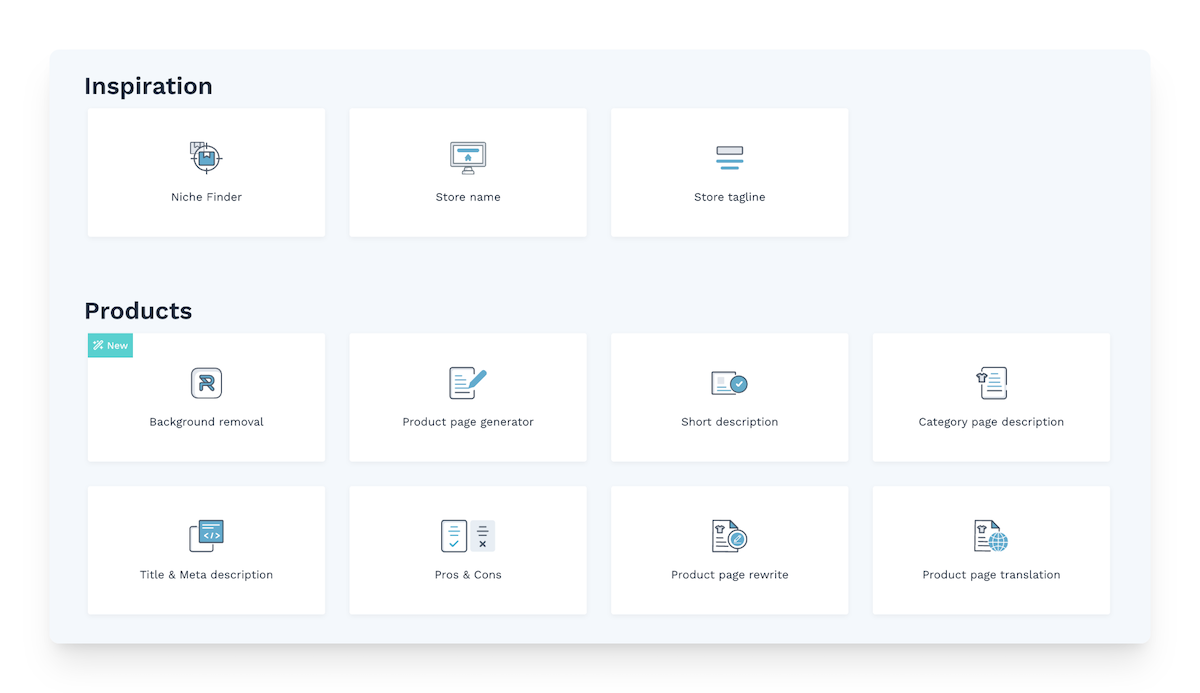
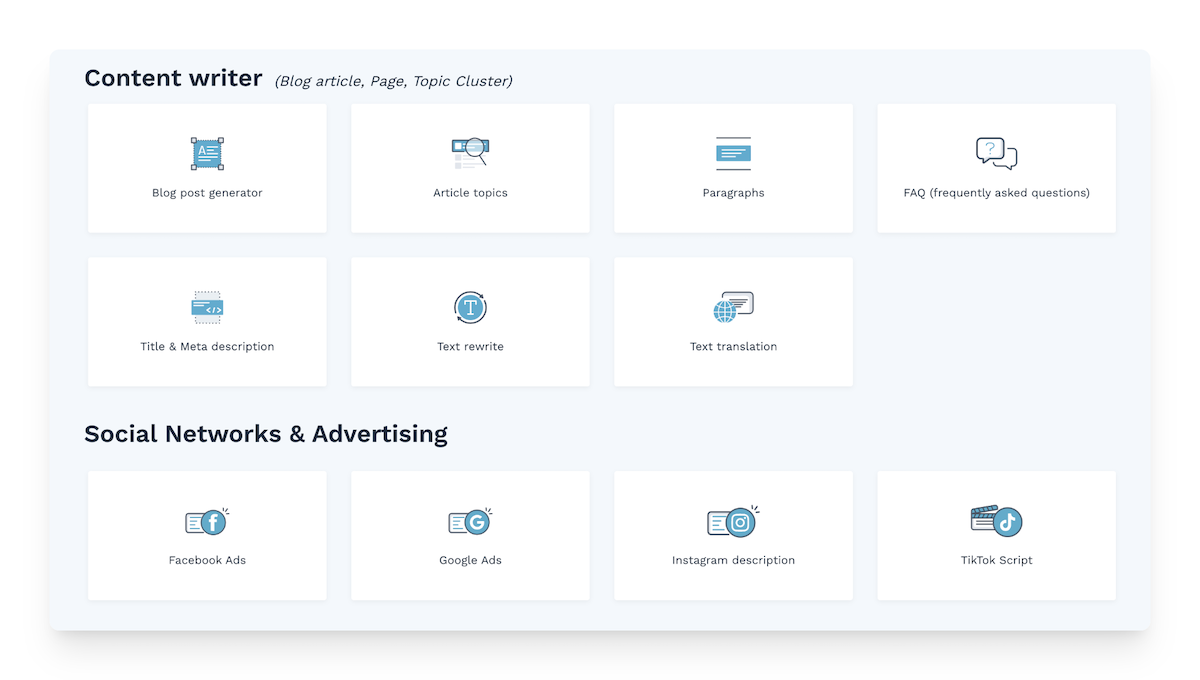
WiziShop AI features available in your dashboard
In addition to these text-related functions, you can also schedule automatic email reminders, birthday emails, or any other important event for your database.
Take the plunge and get started with WiziShop, your AI-powered solution, designed to make your day-to-day business as productive and efficient as possible in favor of your sales, starting from $24.90 per month.
Test WiziShop free for 7 days and become one of the pioneers of AI-powered businesses!
Try WiziShop free for 7 days
THE EASIEST NO-CODE ECOMMERCE SOLUTION✅ No credit card required
✅ Access to all features
✅ No commitment
8. AI-driven legal assistant
Launching a legal assistance tool that harnesses the power of artificial intelligence allows you to offer a smart, time-saving solution that helps legal professionals cut through the paperwork jungle.
Using natural language processing (NLP) and machine learning, this type of digital assistant can analyze contracts, flag risky clauses, research case law, summarize legal documents, and ensure compliance with regulations in a short period of time.
Your AI tool or platform could be perfect for solo attorneys, small law firms, or even in-house legal teams drowning in documents. It can integrate with existing practice management software and be personalized to suit specific practice areas like corporate law, IP, or real estate.
Note that it’s advantageous to partner with legal advisors early to ensure that your AI stays compliant and accurate.
If this business idea interests you, consider starting with one niche, such as contract review for startups, and scale gradually. Trust and transparency are key, so consider offering audit trails or explainable AI outputs to earn user confidence.
9. Automated podcast editing and summarization
You likely have noticed that podcast popularity has skyrocketed in recent years.
According to the Podcast Index, there are currently over 4.5 million podcasts worldwide. And these podcast creators have varying technological skills, time, and budgets.
You can save podcasters time and help them sound like pros without needing a studio by developing an AI-powered tool that takes raw podcast audio and works its magic by cleaning up all the “ums,” “ahs,” background noise, and awkward pauses.
It then goes a step further by generating crisp show notes, episode summaries, SEO-friendly titles, and even social media snippets, all in minutes.
Employing speech recognition, natural language processing, and audio enhancement algorithms, this tool streamlines the entire post-production workflow. It’s ideal for indie podcasters, marketers, educators, or businesses running branded audio content.
To boost your chances of success with this business idea, you might opt to start by targeting niche creators, such as business or wellness podcasters, who often lack time or editing skills.
Aim to make your tool’s interface simple, allow drag-and-drop uploads, and think about offering integrations with platforms like Spotify or Buzzsprout. You might even add voice cloning or auto-generated intro/outro music to stand out further.
10. AI-powered mental health companion
Mental health awareness is rising, but access to care is still limited. Millions seek daily support between therapy sessions—or in the absence of them entirely.
An AI companion app bridges that gap with privacy, empathy, and 24/7 availability.
This type of app uses conversational AI to, for instance, offer daily emotional check-ins, guided journaling, mood tracking, stress-reducing exercises, suggestions based on cognitive behavioral therapy, and gentle nudges to practice mindfulness.
It’s designed to promote mental well-being without replacing professional therapy.
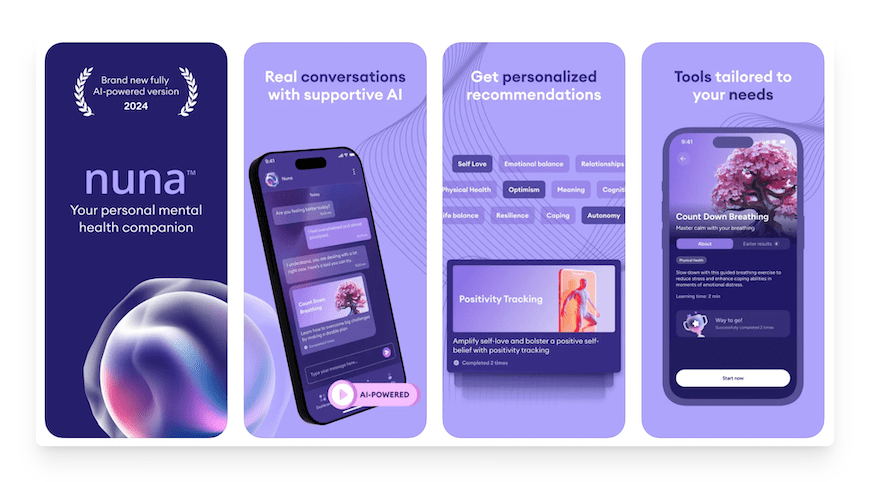
Nuna, an example of an AI-powered mental health app
Of course, as with any product related to health, performing thorough research is essential. It’s also a good idea to connect with mental health professionals during development to ensure that your content is based on evidence.
Keep in mind that it’s crucial to prioritize privacy, trust, and transparency for this type of product, verifying the security of app data and offering optional human escalation.
11. AI financial planning assistance
Another great way to incorporate artificial intelligence into your entrepreneurial adventure is to create a smart assistant that aids users in budgeting, saving, investing, and planning for big goals, whether it’s buying a house, paying off debt, or building wealth.
Using AI, it can analyze income, spending habits, market trends, and even financial personality to offer personalized advice.
This business idea has plenty of potential, as financial literacy is still low, and traditional advisors can be expensive or intimidating. Millions of people, especially younger generations, want on-demand, data-driven financial guidance without the fluff.
Rather than trying to develop a tool to appeal to everybody, think about starting with a specific audience, say Gen Z freelancers or young families, and concentrate on features they need most. This might include, for example, automated savings goals, debt snowball plans, or beginner investing.
Because your tool will deal with people’s money, security and regulatory compliance should be top concerns. Consider also engaging in partnerships with fintech apps or banks to bolster trust in your offering.
12. Voice AI for customer support
These days, businesses, whether experienced companies or new startups, are increasingly seeking ways to reduce customer service costs while improving response time and user satisfaction.
With rising customer expectations and staffing challenges, a well-trained voice AI tool can be a game-changer!
This AI-powered solution uses natural language processing and voice synthesis to handle Tier 1 and Tier 2 support calls, from answering FAQs to walking customers through troubleshooting steps, appointment scheduling, or account updates.
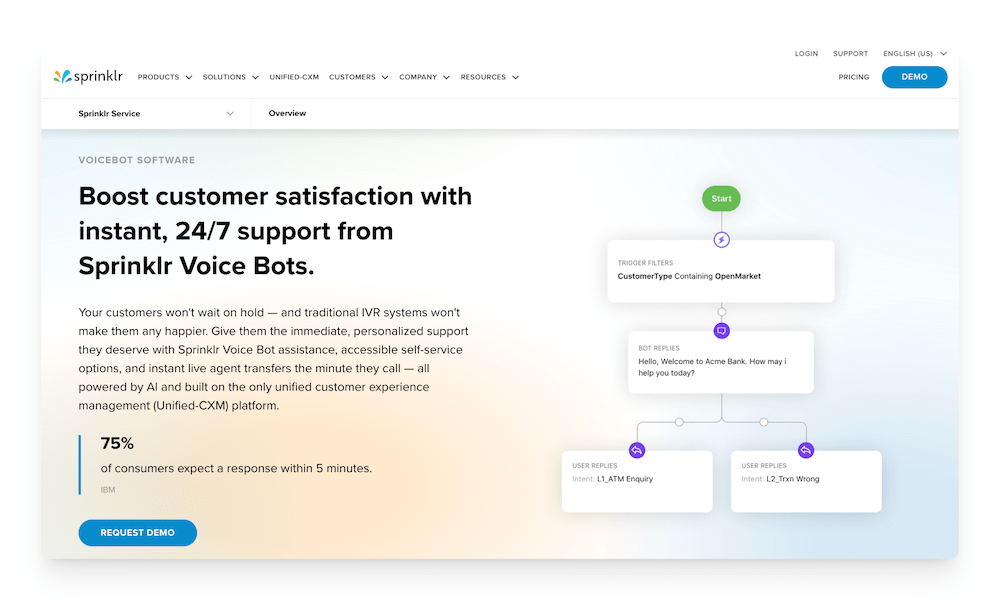
Sprinklr Voice Bots, an example of voice AI
A high-quality voice AI tool for customer support is like hiring a super-reliable, multilingual, never-sleeps call center agent that delivers consistent, friendly service—every single time.
With this business idea, you’ll want to focus on industries with high call volumes, like ecommerce, telecom, or healthcare.
To avoid that dreaded “robot voice,” aim for human-like voice quality and natural conversation flows. Offer seamless handoffs to human agents when needed, and let your clients customize tone and language style to best suit their needs.
13. AI-driven market research reports
Creating a platform that scrapes data and trends from the web and generates customizable, real-time industry reports for startups or investors combines the power of artificial intelligence with the ever-growing demand for data-driven insights.
Whether they’re small, medium, or large, businesses require fast, reliable intel to stay ahead of the competition, and AI can deliver that at a fraction of the cost of traditional market research firms.
Plus, the demand for AI-driven market research reports is growing across industries: tech, retail, healthcare, finance, and beyond!
Instead of spending weeks gathering and performing data analysis manually, businesses can avail of your platform to instantly generate tailored, in-depth reports on market trends, customer behavior, competitors, and emerging opportunities.
This AI tool can scan thousands of sources, including news, social media, databases, and even patent filings, and distill the key takeaways into easy-to-read, actionable insights and ideas on how to improve.
Be sure to offer customizable report templates and ensure transparency in how your AI gathers and processes data. Why not also add a human-in-the-loop option for premium clients who want expert review?
14. Intelligent data analytics service using AI
Intelligent data analytics services using AI help businesses analyze large volumes of data quickly and accurately.
By leveraging machine learning and automation, these services uncover patterns, trends, and insights that guide smarter decisions, everything from customer behavior to sales forecasts, saving time, reducing errors, and boosting overall business performance.
As companies are drowning in data but starving for insights, starting a data analytics service that uses AI could help them make sense of it all—spotting trends, predicting outcomes, and improving decision-making with speed and accuracy.
With this business idea, you’ll build or use AI tools that process large datasets, generate reports, and offer real-time recommendations.
Because you’ll likely be working with a variety of businesses and technological skill levels, it can be beneficial to prioritize user-friendly dashboards where your clients can easily view their data analytics and reports, perhaps also offering customizable insights and integrations with popular platforms.
15. AI fraud detection
With more and more business transactions taking place online, many industries have seen an increase in fraud, and companies are desperate for faster, smarter ways to stop it.
Artificial intelligence can serve as a valuable tool to fight against various types of fraud through automation, providing a great business opportunity for aspiring entrepreneurs.
AI fraud detection uses machine learning to identify suspicious patterns and unusual behavior in real time, helping businesses detect and prevent fraud.
Analyzing large volumes of data allows AI to flag anomalies faster and more accurately than traditional methods, reducing risk and protecting both companies and their customers.
As the owner of an AI fraud detection business, you’d be able to assist companies in saving money, protecting customers, and remaining compliant with ever-tougher regulations.
This kind of business entails working on the development or integration of machine learning models that detect anomalies, adapt over time, and work across industries like banking, ecommerce, and insurance.
16. Smart home automation systems
Smart home automation systems use technology, often powered by AI, to control household devices like lights, thermostats, security cameras, and appliances through apps or voice commands. These solutions are popular because they make life more convenient, energy-efficient, and secure.
Imagine your coffee brewing when your alarm goes off or your lights adjusting based on your mood!
Building smart home systems is a great AI business idea because it taps into a booming market with rising demand. AI makes these systems smarter over time, learning habits and optimizing comfort and efficiency, which is excellent for both consumer satisfaction and recurring revenue.
Here are some different product ideas to inspire you, whether you’re looking to create offerings for consumers or businesses:
- AI-powered energy-saving thermostats,
- smart lighting that adapts to routines,
- voice-controlled kitchen appliances,
- predictive maintenance alerts for devices,
- facial recognition doorbells,
- pet-monitoring systems with activity alerts,
- AI-driven home cleaning robots,
- security systems that detect unusual behavior, and
- smart mirrors with daily briefings.
17. AI games
AI-powered games offer dynamic, personalized experiences. Think about it… Characters can learn from player behavior, environments can adapt, and gameplay can evolve in real time.
Creating an AI game is a smart startup idea that blends innovation with entertainment in a booming industry, opening doors to standout products that engage users deeply and encourage repeat play.
AI game development involves combining machine learning or procedural algorithms with traditional game design.
This includes training AI to create responsive NPCs, generate levels on the fly, or adapt difficulty based on player feedback. These elements not only enhance gameplay but also reduce manual design time.
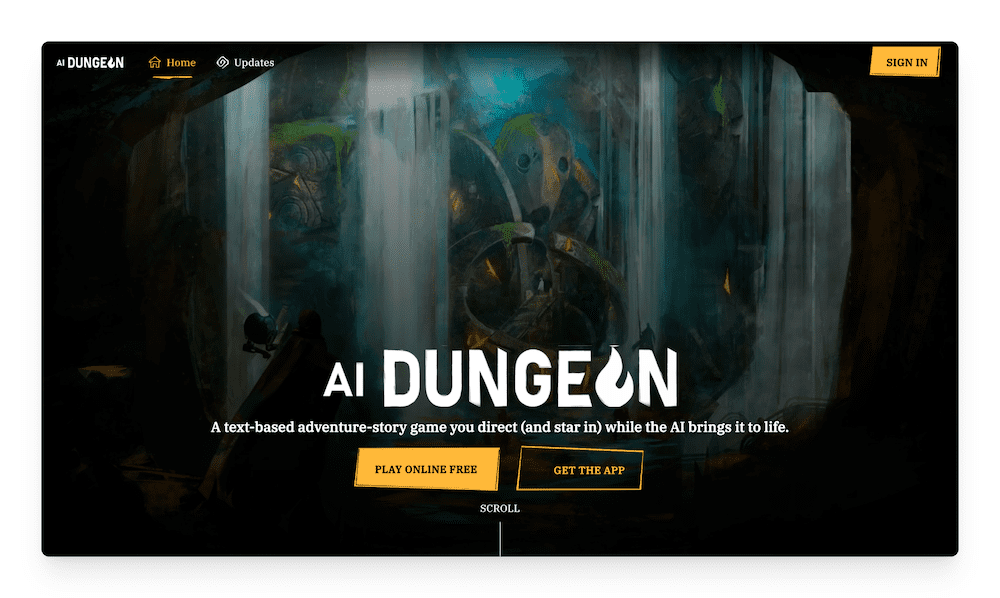
AI Dungeon, a text-based adventure game where AI generates endless storylines based on user input, showcasing the potential for AI-driven creativity and player agency
18. AI personal assistance
As demand for productivity-enhancing services grows, becoming an AI personal assistant can be a stellar startup idea for those who want to offer smarter, faster, and more cost-effective assistance.
Combining human support with intelligent solutions, you work as a personal assistant, but instead of handling every task manually, you leverage AI tools to streamline scheduling, manage emails, organize data, research information, and even generate content.
This hybrid approach boosts efficiency, allowing you to serve more clients, businesses or other solo entrepreneurs like yourself, or offer higher-value services.
In addition, this business idea allows for continuous development, as you can integrate new AI tools as they emerge, refining your services over time.
To boost your likelihood of success as an AI personal assistant, you’ll want to stay up to date on AI development, select the right tools, and learn how to combine automation with a personal touch.
19. AI-integration consulting
With artificial intelligence’s increasing prevalence around the world, many companies are eager to adopt AI… However, they often don’t know where to start!
AI integration consultants help businesses harness the power of artificial intelligence by guiding them through the process of adopting and embedding AI tools into their operations. The demand is growing fast, especially among non-tech industries looking to stay competitive.
From automating customer support with chatbots to streamlining logistics or enhancing data analysis, these consultants identify opportunities where AI can save time, cut costs, and boost performance. They bridge the gap between cutting-edge tech and real-world business needs.
As an AI integration consultant, you become their trusted guide, offering strategy, implementation support, and ongoing optimization.
Furthermore, with so many new tools emerging, businesses need someone who can separate hype from helpful.
What questions should you ask yourself before taking the plunge?
Before taking the plunge into digital entrepreneurship and setting up your own business, you’ll need to go through a period of reflection to understand what motivates you and how you can leverage AI to achieve your goals.
There are a few central questions to consider before making a decision:
- What’s your target market? The first step to success in digital entrepreneurship is to understand who your potential customers are and how you’re going to reach them. It’s important to determine who your ideal buyer is, what their expectations and needs are, and how you can effectively meet those needs.
- What’s your competitive edge? As an entrepreneur, it’s crucial to have a clear and distinctive competitive advantage. This could be an innovative product, an exceptional customer experience, unique expertise, or a well-defined market positioning. It’s essential to understand what differentiates you from your competitors and how you’re going to use that advantage to achieve your goals. Without a doubt, mastering AI will be one of your strong points to get started. Today, the integration of AI into users’ daily lives isn’t yet consolidated, which is where your competitive advantage lies.
- How will you measure your results? It’s crucial to set up clear performance indicators to measure your progress and determine whether you’re achieving your goals. This could include metrics such as conversion rate, sales, bounce rate, or other relevant indicators that allow you to obtain key insights to aid you in improving your business.
- What are the risks associated with your business? As with any business, there are risks associated with digital entrepreneurship. It’s important to understand these risks and put plans in place to mitigate them. This may include risks such as competition, data security, legal or compliance issues, or other risks specific to any business.
Tips for creating an AI tool for your startup business
While some business ideas mentioned in this article simply employ the use of AI, others involve building new AI software or a tool to provide innovative solutions to individual consumers and/or businesses. If you’re feeling inspired by an idea that falls into this second category, here are a few tips to boost your chances of success!
Solve a real problem
The most successful AI businesses are built around real, pressing problems rather than just eye-catching tech. It’s important to identify a challenge that people or businesses face regularly and validate the need for a solution before building anything.
Interview potential customers, gather feedback, and ensure that there’s real demand. A laser focus on solving one specific problem will make your solution more valuable and easier to sell.
Start simple and then scale
If your AI business idea for your startup involves a product, whether an app, service, or a physical item, you may be tempted to build a powerful, all-in-one AI product right away, it’s smarter to start with a minimum viable product (MVP).
Concentrate on one feature that demonstrates your AI’s unique value. Keep it simple, test it in the real world, and improve based on user feedback.
CIterating quickly helps avoid wasted resources and ensures your product aligns with real user needs. You can then scale once you’ve found traction and product-market fit.
Pick the right data strategy
Data is the basis of any AI system. Before launching your business, you’ll need to define how you’ll source, process, and manage the data your models will rely on.
Will you collect your own data, use public datasets, or partner with others?
Make sure that the data is clean, relevant, and ethically obtained. Remember to also verify compliance with privacy laws like the General Data Protection Regulation (GDPR).
Make explainability and trust a priority
Customers and stakeholders want to know how and why AI makes decisions, especially in sensitive areas like finance, healthcare, or hiring.
If your system isn’t very clear, it could cause confusion, hesitation, or even legal trouble. Be sure to build transparency into your AI, offering clear explanations for outputs and ensuring it behaves fairly and consistently.
Trustworthy AI earns customer confidence, speeds up adoption, and sets you apart from competitors who overlook this critical aspect.
Think beyond the technology
Yes, you need a strong AI model for a successful AI business. However, this is only a single piece of the puzzle!
Your business success depends on understanding your customers, refining your go-to-market strategy, and creating a smooth user experience.
Begin by thinking about how you want to package and deliver your AI-powered solution. It’s also crucial to build relationships, offer great support, and understand your pricing model.
Ultimately, people are buying a product or service that makes their lives better, not just the technology behind it.
AI-based business opportunities: The world is your oyster!
The business opportunities offered by artificial intelligence today are many and exciting!
Whether you’re dreaming up your first startup or looking to expand into a new industry, there’s no shortage of innovative ideas to explore: a smart app, data-driven solutions, a streamlined management tool, automated process optimization, etc.
It’s clear that AI offers innovative solutions to current and future challenges and is reshaping how businesses operate.
By focusing on a profitable business idea that leverages AI, you can position yourself at the cutting edge of technology and help shape tomorrow.
The best part? You don’t need to reinvent the wheel. Pick an idea that aligns with your strengths, focus on smart development, and create value where it’s needed most!



